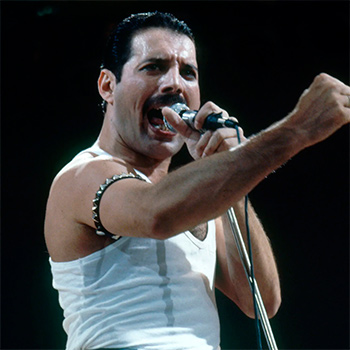
Freddie Mercury (birth name — Farrokh Bulsara) was a British singer, songwriter, pianist and frontman of the band Queen, and one of the most influential artists of the 20th century. His voice, charisma, dramatic performance style and musical ideas forever changed the history of rock music.
Mercury is often called the greatest rock vocalist of all time, the author of “Bohemian Rhapsody”, “We Are the Champions”, “Somebody to Love” and many other immortal hits.
Early years and family
Freddie Mercury was born on 5 September 1946 on the island of Zanzibar (now Tanzania) in a family of Indian origin — Parsis of Zoroastrian descent. His parents, Bomi and Jer Bulsara, worked for the British colonial administration and travelled a lot.
Freddie’s childhood passed between Zanzibar and India, where he studied at St. Peter’s School — it was there that his musical talent first became evident. Teachers noted his phenomenal ear and his rare ability to easily adapt his voice to any style.
During that period he started playing piano, performing in school bands and first used the stage name Freddie.
After political unrest in Zanzibar in 1964, the family moved to the United Kingdom and settled in Middlesex.
The beginning of his musical journey
In London, Mercury studied graphic design at Ealing Art College while immersing himself in the rock culture of the 1960s. There he met future musicians, played in several little-known bands (Smile, Ibex, Wreckage), developed his vocal technique and learned to turn his voice into a true instrument.
He was distinguished by:
-
a vocal range of almost four octaves,
-
the ability to hit powerful, almost “operatic” notes,
-
the skill to switch instantly from baritone to tenor,
-
fantastic stage presence and fluid, expressive movement.
The creation of Queen
The band Queen was formed in 1970:
-
Freddie Mercury — vocals, keyboards
-
Brian May — guitar
-
Roger Taylor — drums
-
John Deacon — bass
It was Mercury who suggested the name Queen and designed the iconic logo with elements of the band members’ zodiac signs.
Freddie quickly became the band’s creative core — he brought in ideas, arrangements, harmonies and full song concepts. His vision was often grand, theatrical and revolutionary for its time.
Breakthrough and worldwide fame
Queen’s early albums already attracted public attention, but the real breakthrough came in 1975 with the release of “Bohemian Rhapsody” — a six-minute rock opera that refused to follow any conventional radio format rules.
The song became a sensation:
-
an innovative structure with no traditional chorus,
-
Mercury’s vocals layered into a “chamber choir”,
-
complex harmonies,
-
theatricality and raw power.
Freddie Mercury became a generational icon — his image combined androgyny, strength, humour and absolute freedom of self-expression.
The golden era of Queen
In the 1970s and 1980s, the band released their greatest hits:
-
“We Are the Champions”
-
“Don’t Stop Me Now”
-
“Killer Queen”
-
“Somebody to Love”
-
“Radio Ga Ga”
-
“Under Pressure” (with David Bowie)
-
“Another One Bites the Dust”
Freddie Mercury wrote many of these songs. Each track carries the imprint of his unique artistic approach: a blend of rock, opera, glam, disco, hard rock and experimental pop.
His stage persona became the blueprint of the perfect frontman: a powerful voice, huge energy, intense connection with the crowd and the ability to command 100,000 people with a single gesture.
Live Aid 1985 — the greatest concert in history
Queen’s performance at Live Aid is often called the greatest live show of all time. From the very first seconds, Mercury had the audience in the palm of his hand — his vocal power, confidence and communication with the crowd set a standard for all future performers.
This set cemented Mercury’s status as the greatest live performer in rock history.
Solo career
In the mid-1980s, Freddie released two solo albums:
-
Mr. Bad Guy (1985) — a mix of disco, pop and ballads
-
Barcelona (1988) — an operatic project with Montserrat Caballé
The album Barcelona became a unique experiment, merging pop music with classical opera. The title track was later chosen as an anthem of the 1992 Olympic Games in Barcelona.
Personal life
Freddie Mercury was a man of two cultures — British and Indian. His personal life was complex and multi-layered:
-
his first great love was Mary Austin, whom he called “the only person I truly trust”;
-
later he had long-term relationships with men, including Jim Hutton;
-
in everyday life he was known as generous and modest, yet on stage he was explosive and larger than life.
Freddie often stressed that his main wish was “to leave something beautiful that will outlive me”.
Illness and final years
In the late 1980s, Mercury learned that he was HIV positive. He made this public only the day before his death — on 23 November 1991.
On 24 November 1991, Freddie Mercury died at his home in London from complications of AIDS.
He worked almost until the very end, recording vocals for the album Innuendo — his voice on “These Are the Days of Our Lives” and “The Show Must Go On” sounds particularly poignant.
Legacy and influence
Freddie Mercury remains:
-
one of the most instantly recognisable voices in music history,
-
a symbol of freedom and self-expression,
-
a pioneer of a new pop rock aesthetic,
Queen’s songs are streamed billions of times every year, and Mercury’s popularity continues to grow.
The film “Bohemian Rhapsody” (2018) became a global hit and revived worldwide interest in his life and music.
Interesting facts
-
Freddie had a vocal range of almost four octaves.
-
He came up with the name “Queen” even before the classic line-up was fully formed.
-
He was an accomplished artist — he designed the band’s logo himself.
-
He could record up to 50 layers of vocals in a single song.
-
He loved cats and dedicated the album Mr. Bad Guy to them.
-
Before recording “Bohemian Rhapsody”, he kept the final structure of the song strictly to himself — everything was in his head.
-
He left most of his estate to Mary Austin, calling her “my common-law wife”.
Freddie Mercury lived a life that cannot be squeezed into the usual frame of a biography. He was more than a singer, songwriter or frontman — his work became a cultural code of an entire era. Freddie proved that art begins where a person stops being afraid to be themselves, and that a voice can become a weapon of freedom stronger than any manifesto. His songs still sound as if he were on stage right now: confident, dazzling, inimitable. And as long as millions of people around the world sing “We Are the Champions” or lose themselves in the drama of “Bohemian Rhapsody”, Freddie Mercury remains alive — in the music, in the legend and in the inspiration he left to everyone who has ever heard his voice.

